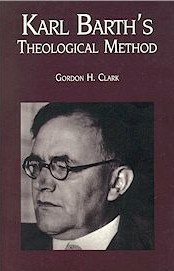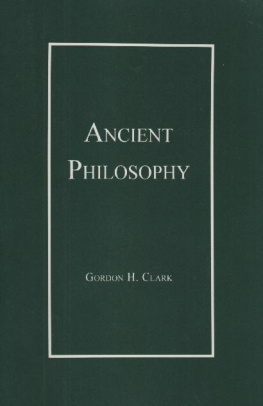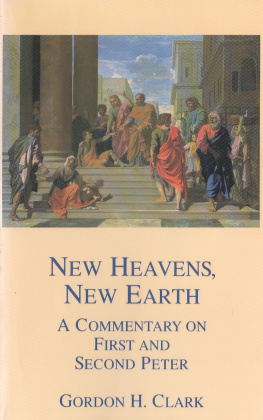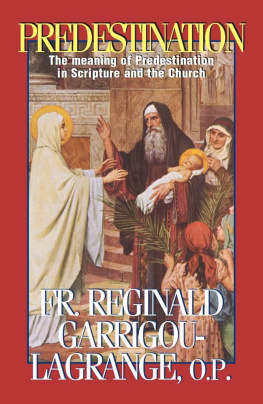Gordon H. Clark - Predestination
Here you can read online Gordon H. Clark - Predestination full text of the book (entire story) in english for free. Download pdf and epub, get meaning, cover and reviews about this ebook. genre: Religion. Description of the work, (preface) as well as reviews are available. Best literature library LitArk.com created for fans of good reading and offers a wide selection of genres:
Romance novel
Science fiction
Adventure
Detective
Science
History
Home and family
Prose
Art
Politics
Computer
Non-fiction
Religion
Business
Children
Humor
Choose a favorite category and find really read worthwhile books. Enjoy immersion in the world of imagination, feel the emotions of the characters or learn something new for yourself, make an fascinating discovery.
- Book:Predestination
- Author:
- Genre:
- Rating:5 / 5
- Favourites:Add to favourites
- Your mark:
- 100
- 1
- 2
- 3
- 4
- 5
Predestination: summary, description and annotation
We offer to read an annotation, description, summary or preface (depends on what the author of the book "Predestination" wrote himself). If you haven't found the necessary information about the book — write in the comments, we will try to find it.
Predestination — read online for free the complete book (whole text) full work
Below is the text of the book, divided by pages. System saving the place of the last page read, allows you to conveniently read the book "Predestination" online for free, without having to search again every time where you left off. Put a bookmark, and you can go to the page where you finished reading at any time.
Font size:
Interval:
Bookmark:
Gordon Haddon Clark
Predestination
1987
Elizabeth Clark George and Lois A. Zeller
2006
John W. Robbins
All rights reserved.
Published by The Trinity Foundation
Post Office Box 68
Unicoi, Tennessee 37692
www.trinityfoundation.org
Perhaps no teaching of the Bible is more hated than its clear and pervasive teaching that God is Almighty. The phrase the sovereignty of God is frequently used by pastors and preachers, and religion is very popular in America. Everyone talks about God, but the God they talk about is not the God of the Bible, and what they mean by the phrase the sovereignty of God bears little resemblance to the Biblical doctrine of Gods power.
Sinful men, as Paul explained in Romans 1, do not like to retain the idea of God in their minds, so they try to suppress their innate idea of God by fabricating idols and substituting those idols, which they call God, for the God of Scripture. Atheism, the outright denial of God, is a relatively rare phenomenon in the history of human thought. What looms large are the many forms of false religion. This devout, religious hatred of God is found in all cultures and all times. There are tens of thousands of such false religions (their number is limited only by the creative imaginations of sinful men), and so-called great world religions Hinduism, Islam, Buddhism, Catholicism, Judaism are examples of such false religions invented by men (and demons) in order to suppress the truth of God and Scripture.
Even in many so-called Christian churches, false ideas of God prevail. Nominally Christian churches teach that God loves everyone and has a wonderful plan for his/her life. But the Bible contradicts that notion from Genesis to Revelation. Jacob I have loved, but Esau I have hated, says God in both the Old and New Testaments. (I mention both Old and New Testaments, for many churches falsely assert that the God of the Old Testament is quite different from the God of the New.) Jesus said of Judas Iscariot that it would have been better for him if he had never been born, because of the horrible punishment he would receive for his sins. The notion that God loves everyone is patently false.
Most churches have rejected the Biblical doctrine of God because God does not fit into their imaginative theology. God is all-powerful, but many churches worship a god whose power is limited by mans alleged free will. God is absolutely just, but the churches worship a god who ignores sin and accepts sinful men just as they are. God knows all things, but many churches worship a god who is ignorant of the future acts of human beings. God planned all of history, in every detail, but most churches worship a god who is valiantly struggling to bring about his purposes despite the course of history. Many churches worship a god who wants everyone to be healthy, happy, and rich, but God has chosen specific individuals for salvation, and he has not promised them all health, wealth, or happiness this side of eternity. Many churches worship an ignorant and weak god, but the God of Scripture is he whose eye sees everything, and whose hand reaches everywhere. He will, as Scripture says, by no means clear the guilty and we are all guilty. Just as God did not create us for our pleasure, but for his, so he does not redeem his people because of their good qualities, but solely because of his good qualities. He is both the Almighty Creator and Merciful Redeemer; he is not a valet who caters to our whims.
In this book, Dr. Gordon H. Clark, the greatest Christian philosopher of the twentieth century, presents the Biblical teaching of Gods sovereignty. He begins with the doctrine of creation, a doctrine under continuous attack for the past 140 years by modern men who do not wish to retain God in their minds. But Dr. Clark sees more clearly than many creationists that creation requires omnipotence, and if one believes in creation, one is logically compelled to believe in the omnipotence of God. God is quite literally All-Mighty. He can do whatever he wishes to do, and no one can say to him, What are you doing?
Many books have been written on the subject of predestination, but this book is by far the clearest and the most Biblical of the books yet published. I urge the reader to study it carefully. Do not be misled by the apparent simplicity of the author or his style of writing. Many today confuse confusion with profundity, and when they encounter a book free of confusion, they think it is shallow. Predestination both the doctrine and this book is not shallow; it is profound and clear. Study it well. God requires us to love him with all our minds, and the best way to start is by studying the character of God himself as All-Mighty.
John Robbins
April 2006
One evening I attended a large tent meeting in Indianapolis. In the middle of the sermon, as the evangelist warmed up to his subject, he launched into an attack on predestination; or, to make the situation clear, one might say that the evangelist attacked the Calvinistic doctrine of predestination. After about ten minutes of this, he seemed to be satisfied that he had pretty well made his point. But he hesitated a moment. Perhaps a fleeting thought occurred to him that after all the Bible does indeed speak of predestination. So he added, Of course, and I particularly noted the of course, I accept what the Bible teaches about predestination. The only trouble was that he never gave his audience the least hint of what he thought the Bible teaches.
If the Bible has something to say about predestination, surely we ought not to skip those passages. But many people would like to. They say the doctrine is controversial and should not be discussed. This is what a Bible teacher told his class in an allegedly Christian college, Predestination is controversial. One of the students was a young Bulgarian. He wanted to learn and to preach the Gospel. He listened to the professor and dutifully took in his words. Not wishing to delay his Christian service, he took a Sunday School class of Bulgarian laborers in Chicago. Here he could teach them the simple Gospel. But to his amazement they questioned him on predestination. The poor young man he had accepted his teachers advice, had never studied the subject, and could not minister to his people.
It is strange too that this semi-Christian college, with its aversion to controversial doctrines, did not mind taking insistent positions on other doctrines that were equally controversial among Christians equally controversial and much less important. It would seem that those who decry controversy mean to prevent others from disputing their own peculiarities.
There are, however, more reputable, less superficial, more scholarly Christians who have issued warnings about studying this doctrine. One of these gentlemen was John Calvin himself, whom the evangelist so disliked.
In the Institutes, Book III, xxi, 1-2, Calvin wrote,
The discussion of predestination a subject of itself rather intricate is made very perplexed, and therefore dangerous, by human curiosity, which no barriers can restrain from wandering into forbidden labyrinths, and soaring beyond its sphere, as if determined to leave none of the divine secrets unscrutinized or unexplored. As we see multitudes everywhere guilty of this arrogance and presumptionit is proper to admonish them of the bounds of their duty on this subject.
Calvin did not explain who these people were who tried to leave no divine secret unscrutinized. Undoubtedly there were such people in his day. But in the twentieth century the opposite trouble plagues the Christian community. There are too few people who wish to understand even the simplest Biblical teaching. This is not a theological age. Some writers say that it is a post-Christian age. What is needed today is an exhortation to study the Bible. And it would seem that there is less danger in studying the Bible than in ignoring it.
Font size:
Interval:
Bookmark:
Similar books «Predestination»
Look at similar books to Predestination. We have selected literature similar in name and meaning in the hope of providing readers with more options to find new, interesting, not yet read works.
Discussion, reviews of the book Predestination and just readers' own opinions. Leave your comments, write what you think about the work, its meaning or the main characters. Specify what exactly you liked and what you didn't like, and why you think so.














